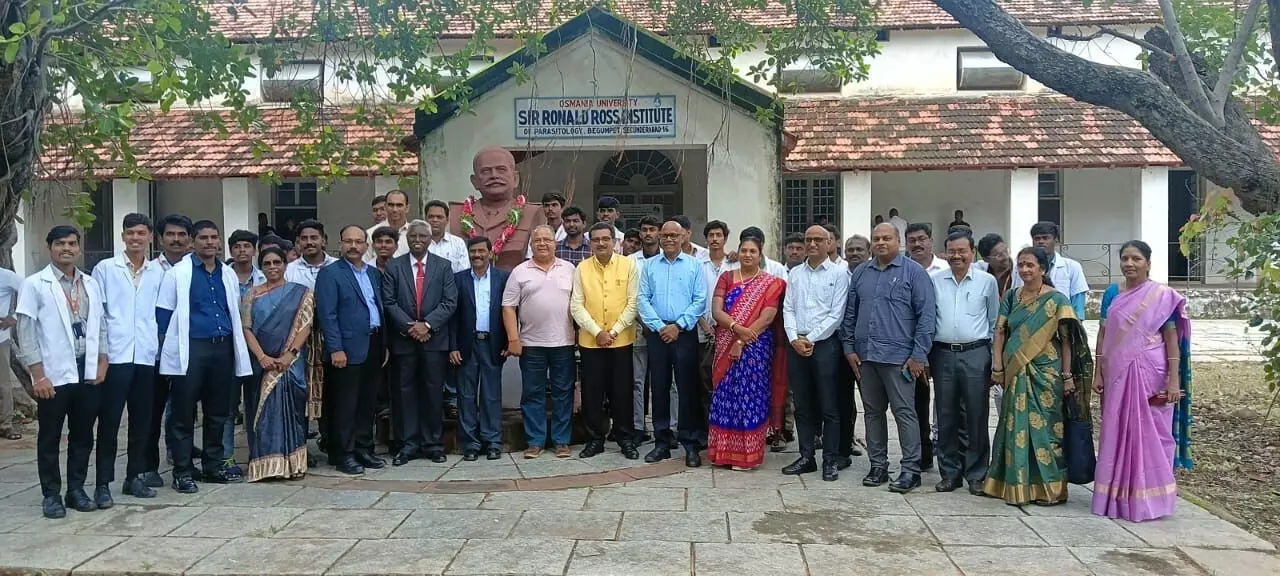World Mosquito Day: 100 OU students, scholars pay tribute to Ronald Ross
100 paramedical students, research scholars and faculty members to reflect on Sir Ronald Ross’s enduring impact on global health.
By Newsmeter Network
Hyderabad: The Sir Ronald Ross Institute of Parasitology at Osmania University marked World Mosquito Day with a seminar dedicated to the Nobel laureate whose discovery of the mosquito’s role in malaria transmission changed the course of medical science.
The event brought together more than 100 paramedical students, research scholars and faculty members to reflect on Sir Ronald Ross’s enduring impact on global health.
Tribute to man who served humanity
Prof G Prabhakar, Principal of the University College of Science, inaugurated the session with a tribute to Ross. He described him as ‘a man driven by insatiable curiosity and a noble mission to serve humanity.’
Dr Chandrashekhar, Dean of the School of Nursing at Yashoda Hospitals, Hyderabad, shared personal memories of his research days at the institute. He said, “The institute has been a cradle of scientific inquiry and innovation, and my time here deeply shaped my academic journey.”
Remembering the scientist and the poet
Prof Karunasagar, Dean of the Faculty of Science at Osmania University, recalled Ross’s landmark discovery and also highlighted his literary side. “Ross was not only a scientist but also a poet,” he said, before reciting one of Ross’s verses.
Dr Rama Devi, Professor and Head of Physiology at Gandhi Medical College, underlined the critical role of paramedics in modern public health. “Paramedics are the frontline defenders against communicable diseases, especially those transmitted by mosquitoes,” she remarked.
Antilarval operations are important for mosquito control
Prof S Jithender Kumar Naik, Officer on Special Duty to the Vice Chancellor, spoke about the university’s responsibility in carrying forward Ross’s vision. “We are committed to nurturing a scientific temperament among youth so that Ross’s story continues to inspire generations,” he stated.
CN Raghu Prasad, Additional Commissioner of GHMC, addressed civic measures to fight mosquito-borne diseases.
He cautioned against relying on fogging as a solution. “Fogging is an eyewash,” he said. “The most effective measures are the antilarval operations carried out by entomology teams, which remain critical to mosquito control.”
The seminar’s keynote was delivered by Prof Dr BK Tyagi from the Department of Bioscience, Chandigarh University. He linked Ross’s work to contemporary public health goals. “Ross’s arduous scientific journey is a guiding light for India’s Viksit Bharat initiative, which aims to eliminate malaria by 2030,” he said.
Indigenous knowledge systems
Prof Tyagi also pointed to India’s traditional knowledge systems.
“Our ancient knowledge holds untapped potential for technological and medical breakthroughs,” he noted.
During the interactive session, he responded to student queries and reinforced the gravity of Ross’s findings. “The mosquito, a seemingly innocuous insect, is in fact a deadly foe of humanity,” he said.
He further emphasised Ross’s Indian roots: “Ross, born in India, was the first Indian-born scientist to receive the Nobel Prize in Physiology or Medicine. His legacy illuminates the path for global scientific advancement.”
The event was coordinated by Prof. B Reddya Naik, Head of the Department of Zoology and Director of the Ronald Ross Institute of Parasitology. In his closing remarks, he stressed preventive action. “Source reduction, eliminating stagnant water and breeding sites, is the first and most crucial step in preventing mosquito-borne diseases,” he said.
One Health national policy
He pointed out gaps in awareness. “A lack of understanding of mosquito bionomics continues to cost lives. Community education and proactive prevention are essential,” Prof. Naik added.
He also highlighted India’s One Health national policy.
“One Health recognises the interconnectedness of human, animal, and environmental health. Integrated action across sectors is critical to control emerging diseases at the human-animal-environment interface,” he explained.
The seminar concluded with a call for continued education, collaboration, and civic responsibility in the fight against mosquito-borne diseases.
The program reinforced that Sir Ronald Ross’s discovery remains central to global health progress. His legacy, as speakers emphasised, is not only preserved in textbooks but continues to guide efforts toward building a healthier and safer world.